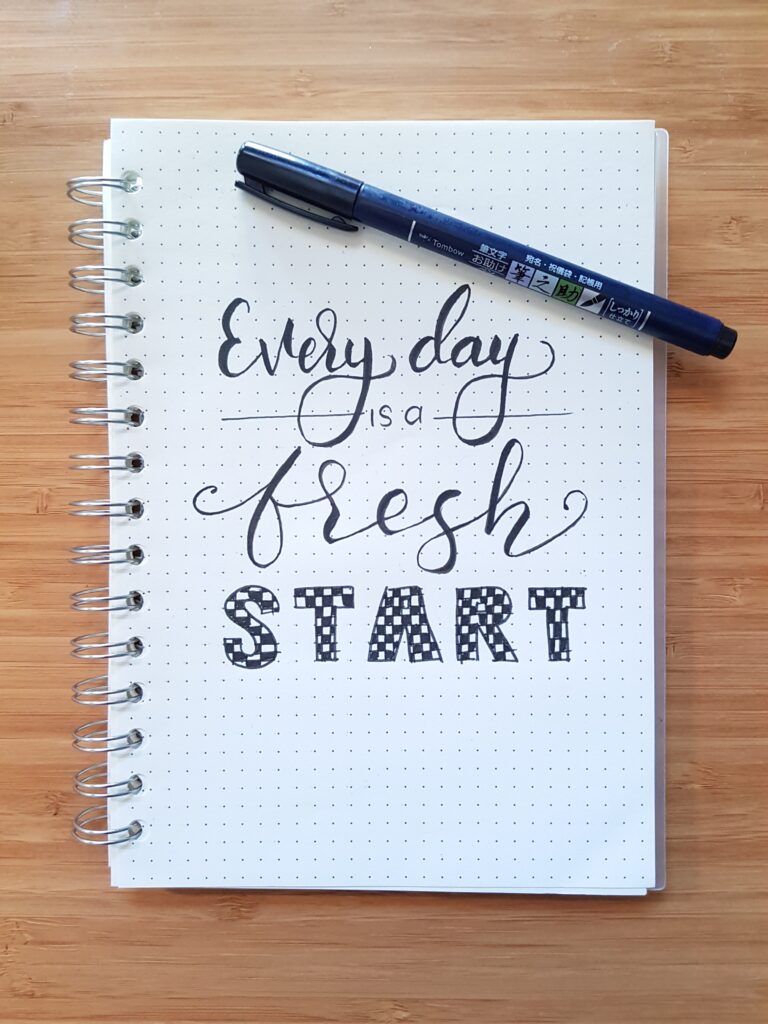A blog post about how to build discipline?
We’re really leaning into the goal-setting craze that is the very personality of January 1, aren’t we?
As cliche as the notion is, a new year has a way of giving us fresh vigor for new (and old) ambitions. We find ourselves with a renewed interest in self-development that will actually lead to results this time. (No, for real.)
In all seriousness, a big part of our ability to make resolutions, set goals, and keep those goals is discipline.
I’m not an expert on how to build discipline, but I have made exciting strides in my writing discipline and would like to share what I’ve learned.

What is Discipline?
Discipline, or self-discipline, can be defined as doing the hard thing instead of the easy thing. It is choosing to set aside the comfortable for the uncomfortable.
Self-discipline is the act of training oneself for improvement. It is also an activity or exercise that develops or improves a skill.
Discipline vs. Self-Discipline
Discipline – is something that gets results based on external reinforcements.
Self-discipline – is something that gets results based on internal motivation.
Many of us don’t have many issues with being disciplined at work. Showing up on time and getting our work done is a mundane task. We have a boss to please, coworkers to come through for, and most of all, a paycheck to collect. Fulfilling our work duties is much more accessible than completing tasks that affect no one else and require self-discipline.
The disconnect for many of us happens when we have something we want to accomplish for ourselves. No external forces to please here. Just us. This category is filled with familiar topics like drinking water, daily exercise, dishwashing/house cleaning, starting a business, etc. It’s easier to choose to chill and not do these things when there is no pressing reason other than ourselves. And I don’t know about you, but there has to be a pressing reason for me to mop my floors.
My Struggle with Discipline
The idea of being disciplined has always been something I have strived for. Even when I didn’t even know exactly what it was. I look back on my childhood and wonder, why on earth did I decide on my own to get up at 6:00 a.m. as a homeschooled kid to get my math done first thing before everyone woke up? I think it was a mixture of things. I wanted quiet, and I routinely saw my dad wake up early and do hard things in the morning.
Once I got to college, I had no issues excelling in the world of academia. 1) I liked school and 2) the parameters were clear and easy to follow. It was a no-brainer after I discovered I could speed up the process of getting my college degree by leveraging self-discipline to take CLEP exams. This made me feel confident in my ability to put my mind to things and do them.
This confidence quickly disappeared after graduation, though. When it came to things that had little tie to external motivation, like my writing, I struggled. I learned that it is hard to come through for yourself when the goal is strictly a personal venture. I think many of us deal with this.
It has taken me years to get to the place where I am consistently writing and putting out content. This blog has been a major instrument in that area.
So far, I’ve learned a few things about how to build discipline when the goal is based on internal drive. Let’s get into it.
5 Tips for How to Build Discipline (When No One Else Cares)
When it came to my writing, I felt truly stuck. I felt like I wasn’t good at it and like it was a waste of time. Even though I had the nagging desire to write, I just didn’t.
This is one of those, if you know, you know types of things.
While I think many aspiring writers may feel this way, there are plenty of us who have other desires for our lives that make us feel truly and fully stuck.
Maybe it’s working out, or getting your finances in order. Perhaps it’s pursuing a certificate or degree that will help you get out of a dead-end job. Or maybe it’s something in the creative space, like my example. Do you want to start a YouTube channel or start using Instagram or TikTok to build an audience and a brand?
There are a sea of examples. You get the gist. Let’s look at some tips that may help.
1. Don’t Tell Anyone about What You Are Doing
But What about Accountability?
Listen, some people may encourage you to tell at least one human being what you are setting out to do. It’s usually in the spirit of accountability. And I get that completely.
My one person is my built-in person, my husband. He is the only one who has helped me in the low times and the uncertain times. I started this blog because he encouraged me to take action and stop stalling with choosing the perfect blog theme.
The balance to the idea of telling no one is, accountability is in fact important. When choosing who to tell, choose wisely and choose someone who you know is in your corner.
Why Keep it Low Key
Having said all that, my #1 tip for building self-discipline is to tell close to no one. Keep it lowkey. No one needs to know that you started a blog. They do not need to know you started a YouTube channel. And no, nobody needs to know you go to the gym now. Just keep it to yourself or your immediate family.
I have found endless comfort in the fact that I don’t have people I know judging what I’m doing. No one has an opinion because they are not invited to. You may think there’s not enough support in this hush-hush method, but I argue that this approach is training you to be exactly what you need to be. That is, being accountable to yourself and being self-disciplined because you said so. Not because of social pressure.
The Balancing Thought
Of course, people really don’t have that many opinions about what you choose to do. And people think about us way less than we give ourselves credit for. The principle is, try to start building self-discipline with as little noise around you as possible. You have enough of your own self-doubt, lack of discipline, and sometimes even self-loathing to overcome. Let’s no add the thought of external opinions.
So, when you set out, set out alone. Once you’ve proven to yourself that you can come through for yourself, there will come a time when you very much want to share what you are doing. And you should. This tactic isn’t meant to be forever. Unless you want it to be.
2. Come Through for Yourself
This leads us to the concept of coming through for yourself.
This is the biggest key to how to build discipline. Once I hit the publish button on my first blog post, I was terrified of the next post date.
I decided to post every Thursday at 9:00 a.m. After that first post, the time started ticking away and I got more and more anxious. I felt that I would surely miss my deadline. Deadlines have always intimidated me, especially with writing. When it is a self-imposed deadline, I have a horrible track record of keeping my word to myself.
Does this sound familiar? You keep commitments to others, easily. It is simple to be considerate of what others say or need. The issue is applying that same level of commitment to yourself. I felt all the regular struggles and excuses rising up during that week.
What if the post wasn’t good at all? What if it wasn’t perfect?
Push Past the Fear
I pushed past this and wrote a post that I published at 9:00 a.m. the following Thursday. Once I did that, I had so much relief. It’s almost silly how our relationship with ourselves can be just as rocky as a relationship with a friend who doesn’t come through for us. It would be silly if it wasn’t true.
Continue to build on this positive foundation by coming through for yourself the following week. Start making small choices that will set you up to hit your goal again and again. Instead of choosing to watch Netflix or YouTube, set aside time to work on your goals first. You’re keeping your commitment to yourself here. This needs to become serious business. Just like you’d schedule coffee with a friend, schedule time to work at your goal.
Treat your word to yourself with the same consideration as your word to someone else. And hey, when things inevitably come up, renegotiate the deadline with yourself. But don’t just let it pass like it didn’t matter.

3. Don’t Buy into Perfectionism
Where are all my self-proclaimed perfectionists out there? I’m here to say that this is certainly not something to proclaim over yourself.
The draw of perfectionism is it sounds like you just have high standards, and who wouldn’t want that, right? High standards or a desire to put out a good product is one thing. The crippling fear and paralyzing pride that is the root of perfectionism is the thing we need to avoid.
It has taken me years to realize that pride is the root of why I’m so hard on myself. I used to think being hard on myself was a bit much, but that it was overall a net positive. It was something that made me strive to be a high achiever. Wrong. This is so wrong.
Being hard on myself seemed like the right thing to do. When I fell short of my goals and aspirations, I gave in to self-loathing because I believed I deserved it.
And so, round and round the merry-go-round, we go. Engaging in this destructive thought pattern like it is a way of life. Like it’s a good thing. I used to easily admit to myself that this was overall a positive thing. Nothing about this behavior is positive.
Check Your Pride
When you’re feeling stuck because of perfectionism, you need to check your pride. Pride says you should be a professional from the beginning. It says you don’t need to put in the work, that’s for other people to deal with. Pride says you must hate yourself if you’re not the best. And it loves when you compare yourself and your journey to the journey of others. It assumes your journey is worth rising above and surpassing everyone else’s.
I’m embarrassed that it took me so long to realize that pride was the root of this issue. This mindset has stolen years of honest productivity from me. And it has, for the most part, killed a lot of my joy.
When I feel s tuck now, I shrug it off and continue to put in the work. Especially when it comes to writing, it’s the same hard work every time. Go listen to an interview with any songwriter out there, they’ll tell you. Billie Eilish, Ed Sheeran, John Mayer, Taylor Swift–all of these artists write and grind it out for every single song.
It may get easier and it may not. At the end of the day, humility is the mindset we need to cultivate. And being a student of our craft should be the default.
4. Organize a Schedule and Stick to It
After you get over the first couple of weeks of coming through for yourself, it’s time to prioritize a schedule. Set up something that is repeatable and build a routine around it. A structured schedule is often the answer to the question how to build discipline.
Good scheduling comes from knowing yourself and your preferences. Obviously, you can’t cater to all of your preferences. Denying your preferences is a huge part of self-discipline, after all. I’m talking about setting up things that match how you work best.
Start by choosing to work with your natural tendencies. I like to write early in the morning before work. When I choose to sleep in and get my writing done after the workday, I never get as much accomplished. This is because I work as a technical writer and because my creative brain just functions better in the morning. I prioritize going to bed at a certain time so I can get up and write.
With all this talk of building your perfect schedule, don’t be afraid to overhaul it. The goal of a schedule is to set aside time to make things happen. Making headway toward the endeavor you are pursuing is the point. As soon as a need changes, change the schedule. If a preference needs to change for the sake of a schedule that will actually help you achieve what you are going for. Do it.
Knowing how to build discipline often comes down to knowing when to reorganize and do the perceived hard thing over the easy thing.
5. Discipline Stacking
Now we come to the place everyone reaches when learning how to build discipline. How do we get our discipline to apply to other areas of our life?
This is something I’m very much still working on. I think the answer is being ruthless with our use of time. When we’ve achieved building discipline in one area of our life, it is a matter of using the same tactics to add other goals to the list.
Discipline stacking is a term I borrowed from the world of travel hacking. Travel hacking is learning how to combine multiple ways of saving money on travel for ultimate savings.
Discipline stacking is the idea of associating a disciplined area of your life with a not-so-disciplined area of your life. For instance, if you’ve mastered the discipline of working out every afternoon, stack that discipline with cooking a healthy meal after your workout.
If I know I am more disciplined during the workday, I can choose to roll that discipline into cleaning my bathroom during my lunch break or getting some proactive writing or scheduling done during that time.
Remember, a core concept of discipline is pushing aside the things we see as comfortable (like sitting and scrolling on our phones) and replacing them with more meaningful things that will help us become the person we know we need to be.
Bottom Line
The irony of this post is that I’m writing this at the 11th hour. It’s 7:52 a.m. on post day and I have yet to finish. I still need to get SEO set up and images found and the list goes on.
The bottom line is, learning how to build discipline involves being on track and falling off track. In my case, I still go through phases of being ahead of schedule and being behind schedule (thanks holidays).
The point is, we need to learn to continue down the path of learning how to build discipline, even when we get off track.



